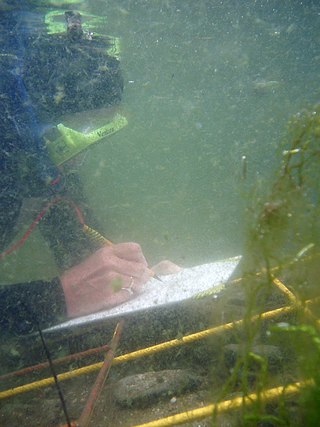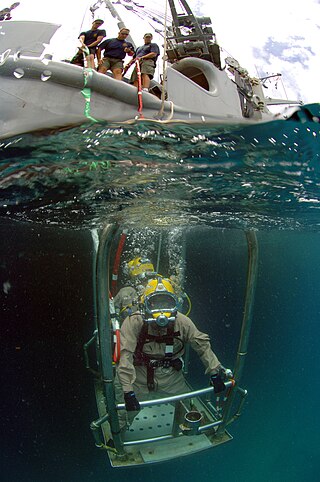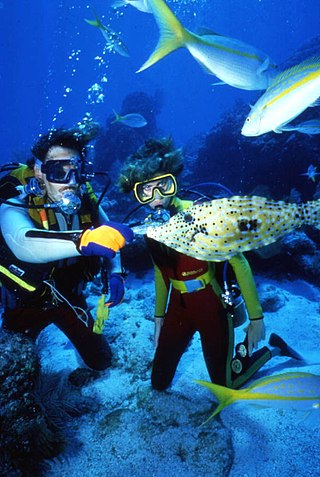Dee Scarr | |
|---|---|
| Occupation(s) | Scuba diver, environmentalist |
| Spouse | David Batalsky |
Dee Scarr is an environmentalist, marine naturalist, and scuba diver who lives and works in Bonaire.
Dee Scarr | |
|---|---|
| Occupation(s) | Scuba diver, environmentalist |
| Spouse | David Batalsky |
Dee Scarr is an environmentalist, marine naturalist, and scuba diver who lives and works in Bonaire.
Scarr received bachelor's and master's degrees in English and rhetoric and public address from the University of Florida and taught high school English, public speaking and debate. Afterward, she became a scuba instructor in Florida in 1974 and began her diving career on the island of San Salvador. Dee arrived Bonaire in 1980 and started working in the Bonaire National Marine Park. In 1982 she created the diving program Touch the Sea. [1] In 1985 she married David Batalsky. Between 1988 and 1991, Scarr and her workmates tied more than 600 sponges back onto pilings beneath Bonaire's Old Pier in Touch the Sea's Sponge Reattachment Project. In the mid-1990s she surveyed Bonaire's harbor area, removing trash, establishing misused areas and informing the Bonaire Marine Park to educate misusers. The first major recognition of Scarr's work was in 1991, when she was the second recipient of the PADI-SeaSpace Environmental Awareness Award, after Jacques Yves Cousteau. [2] [3]
Scarr was recognized and inducted into the Inaugural Roster 2000 of the Women Divers Hall of Fame at the Beneath the Sea Exposition at the Meadowlands Exposition Center, New Jersey, on 25 March 2000. She was also an inaugural member of the Women Divers Hall of Fame and SSI's Platinum Pro Divers, those with more than 5000 dives; Scarr has logged over 7000 dives. [4] After realizing that dive training agencies did not provide critical information about living coral to their students, she founded Action in Behalf of Coral in 2005. In 2006 she was awarded Captain Don Stewart's Accolade Award for "making knowledge of the sea fun and spreading desire in others to learn and become themselves part of our sea." In 2007 she was awarded the Boston Sea Rovers Diver of the Year Award, the Beneath the Sea Diver of the Year Award for Environment and the Underwater Club of Boston's Paul Revere Spike. In 2008, at the 49th Annual NOGI Awards Gala, she received the Academy of Underwater Arts and Sciences (AUAS) NOGI Award for Distinguished Service, one of the oldest and most prestigious awards in the diving industry. [2] [3]
Dee has written three books: Touch the Sea, about interactions with marine animals; The Gentle Sea, about undersea creatures likely to be encountered by divers; and a children's book, Coral's Reef. For more than a decade Scarr wrote monthly articles about marine animals and their behaviors for Dive Training magazine, and she currently writes for The Bonaire Reporter about marine animals. She was the photographer for the original Guide to the Bonaire Marine Park and contributed to the second edition of the guide. [2] [3]

Diving activities are the things people do while diving underwater. People may dive for various reasons, both personal and professional. While a newly qualified recreational diver may dive purely for the experience of diving, most divers have some additional reason for being underwater. Recreational diving is purely for enjoyment and has several specialisations and technical disciplines to provide more scope for varied activities for which specialist training can be offered, such as cave diving, wreck diving, ice diving and deep diving. Several underwater sports are available for exercise and competition.

Recreational diving or sport diving is diving for the purpose of leisure and enjoyment, usually when using scuba equipment. The term "recreational diving" may also be used in contradistinction to "technical diving", a more demanding aspect of recreational diving which requires more training and experience to develop the competence to reliably manage more complex equipment in the more hazardous conditions associated with the disciplines. Breath-hold diving for recreation also fits into the broader scope of the term, but this article covers the commonly used meaning of scuba diving for recreational purposes, where the diver is not constrained from making a direct near-vertical ascent to the surface at any point during the dive, and risk is considered low.

Hans Hass was an Austrian biologist and underwater diving pioneer. He was known mainly for being among the first scientists to popularise coral reefs, stingrays, octopuses and sharks. He pioneered the making of documentaries filmed underwater and led the development of a type of rebreather. He is also known for his energon theory and his commitment to protecting the environment.
Defenses against swimmer incursions are security methods developed to protect watercraft, ports and installations, and other sensitive resources in or near vulnerable waterways from potential threats or intrusions by swimmers or scuba divers.

Rosalia (Zale) Parry is an American pioneer scuba diver, underwater photographer and actress.
Stephen Frink is a prolific underwater photographer, wildlife photographer, photo journalist, editor and publisher. Frink has contributed to Skin Diver magazine and Scuba Diving magazine. He is currently the publisher of Alert Diver magazine, an upscale quarterly publication for the Divers Alert Network.

Scientific diving is the use of underwater diving techniques by scientists to perform work underwater in the direct pursuit of scientific knowledge. The legal definition of scientific diving varies by jurisdiction. Scientific divers are normally qualified scientists first and divers second, who use diving equipment and techniques as their way to get to the location of their fieldwork. The direct observation and manipulation of marine habitats afforded to scuba-equipped scientists have transformed the marine sciences generally, and marine biology and marine chemistry in particular. Underwater archeology and geology are other examples of sciences pursued underwater. Some scientific diving is carried out by universities in support of undergraduate or postgraduate research programs, and government bodies such as the United States Environmental Protection Agency and the UK Environment Agency carry out scientific diving to recover samples of water, marine organisms and sea, lake or riverbed material to examine for signs of pollution.

Tom Mount was an American pioneering cave diver and technical diver.

Bob Halstead, has made significant contributions to the sport of scuba diving in a multitude of capacities: photographer, author of eight diving books, early innovator in the development of dive tourism, pioneer in the dive liveaboard industry, diving instructor and educator, marine-life explorer and influential diving industry commentator. An ardent diver since 1968, Halstead has over 10,000 logged dives.

Recreational dive sites are specific places that recreational scuba divers go to enjoy the underwater environment or for training purposes. They include technical diving sites beyond the range generally accepted for recreational diving. In this context all diving done for recreational purposes is included. Professional diving tends to be done where the job is, and with the exception of diver training and leading groups of recreational divers, does not generally occur at specific sites chosen for their easy access, pleasant conditions or interesting features.
The Underwater Society of America (USOA) is the peak body for underwater sport and recreational diving in the United States.
The NOGI Awards is an award presented annually by the Academy of Underwater Arts and Sciences (AUAS) to diving luminaries and is "considered the Oscar of the ocean world." Selection of recipients is based on their record of accomplishments and excellence in the diving world. NOGI awards are given out to world-class standouts of the diving community who have distinguished themselves and made a global impact on diving in one or more of four general categories: Science, Arts, Sports/Education, and Environment. A fifth NOGI is given for Distinguished Service.
Hillary Rika Hauser is an American photojournalist and environmental activist with a focus on the oceans — underwater diving adventure, politics, and conservation. In 2009, in recognition of her ocean environmental work as it relates to underwater diving, Hauser received the NOGI Award for Distinguished Service from the Academy of Underwater Arts and Sciences. In 2013 the Academy elected Hauser as president of its board of directors.

Jill Heinerth is a Canadian cave diver, underwater explorer, writer, photographer and film-maker. She has made TV series for PBS, National Geographic Channel and the BBC, consulted on movies for directors including James Cameron, written several books and produced documentaries including We Are Water and Ben's Vortex, about the disappearance of Ben McDaniel.

The following outline is provided as an overview of and topical guide to underwater diving:
Catherine "Cathy" Church is an American marine biologist, SCUBA diver, underwater photographer and educator.

The Bonaire National Marine Park or BNMP is one of the oldest marine reserves in the world. It includes the sea around Bonaire and Klein Bonaire from the high water line to a depth of sixty meters. The park was established in 1979 and covers 2700 hectares and includes a coral reef, seagrass, and mangrove vegetation. The Lac Bay lagoon is also part of the underwater park.

The environmental impact of recreational diving is the effects of recreational scuba diving on the underwater environment, which is largely the effects of diving tourism on the marine environment. It is not uncommon for highly trafficked dive destinations to have more adverse effects with visible signs of diving's negative impacts due in large part to divers who have not been trained to sufficient competence in the skills required for the local environment, an inadequate pre-dive orientation, or lack of a basic understanding of biodiversity and the delicate balance of aquatic ecosystems. There may also be indirect positive effects as the environment is recognised by the local communities to be worth more in good condition than degraded by inappropriate use, and conservation efforts get support from dive communities who promote environmental awareness, and teach low impact diving and the importance of respecting marine life. There are also global coral reef monitoring networks in place which include local volunteer divers assisting in the collection of data for scientific monitoring of coral reef systems, which may eventually have a net positive impact on the environment.

Valerie May Taylor AM is an Australian conservationist, photographer, and filmmaker, and an inaugural member of the diving hall of fame. With her husband Ron Taylor, she made documentaries about sharks, and filmed sequences for films including Jaws (1975).